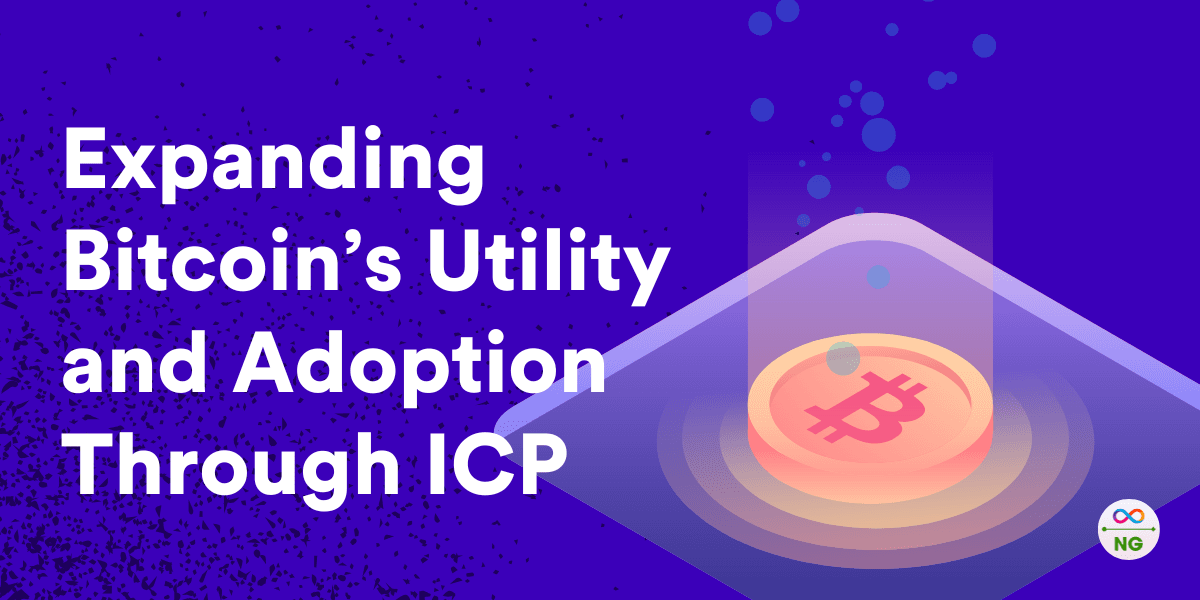
(Overcoming Technical Challenges and the Future Implication of Bitcoin-ICP Integration)
Bitcoin, as you know, is a decentralized digital currency built on an open-source peer-to-peer protocol. It operates using the unspent transaction output (UTXO) model, where transactions create outputs that are subsequently consumed as inputs for new transactions. While Bitcoin's strength lies in its security and decentralization, its lack of native smart contract functionality has limited its potential for complex applications.
Bitcoin, long regarded as digital gold, is now evolving beyond simple transactions to interact with advanced smart contracts seamlessly. With the Internet Computer’s (ICP) direct, bridgeless integration, this vision is becoming a reality—enabling Bitcoin to power a thriving ecosystem of decentralized finance (DeFi) applications without relying on complex or potentially insecure wrapped tokens.
Dominic Williams, Founder and Chief Scientist at DFINITY, highlighted the significance of this development, stating that it brings powerful new smart contract functionality to Bitcoin without the need for insecure and cumbersome trusted bridging services.
How Has The Integration Been Achieved?
This integration is achieved through a combination of protocol-level integration and advanced cryptographic techniques:
- Protocol-Level Integration: ICP nodes replicate the Bitcoin chain state, allowing smart contracts to query Bitcoin's unspent transaction outputs (UTXOs) and validate transactions without relying on intermediaries.
- Chain-Key Cryptography: Utilising threshold ECDSA (Elliptic Curve Digital Signature Algorithm) and Schnorr signatures, ICP enables smart contracts to generate Bitcoin transactions securely. This means that smart contracts can create Bitcoin addresses and sign transactions, facilitating direct interaction with the Bitcoin network.
Overcoming Technical Challenges in Bitcoin-ICP Integration
The integration of Bitcoin with the Internet Computer (ICP) was not without its hurdles. To achieve seamless and secure interoperability, the DFINITY team had to navigate a series of complex technical challenges. Their meticulous approach ensured that Bitcoin could be utilised within ICP’s smart contract framework without compromising the security or stability of either network.
Addressing Bitcoin Testnet Stability Issues
One of the major obstacles faced during the integration was the instability of the Bitcoin testnet. This network, designed for testing Bitcoin-related developments, experienced disruptions such as "block storms," where blocks were generated at an accelerated pace. This issue resulted in long forks, synchronization problems, and difficulties in maintaining consistent network performance.
To counter these challenges, the ICP team revised their approach and migrated to a more stable version of the Bitcoin testnet. This strategic shift enabled smoother integration and provided a more reliable testing environment for developers working on Bitcoin smart contracts within the ICP ecosystem.
Enhancing Security Measures
Security was another critical concern during the integration process. Given Bitcoin’s prominence and high-value transactions, any vulnerabilities in the integration could be exploited by attackers. The ICP team took a proactive stance, implementing multiple layers of security enhancements. These included protections against known attack vectors as well as defences against potential, yet theoretical, threats that could emerge as blockchain technology evolves.
By strengthening ICP’s security infrastructure, the team ensured that Bitcoin transactions executed within ICP’s smart contracts would remain secure, preserving the trust and reliability associated with Bitcoin.
Follow up on the conversation on ICP Forum
Future Implications of the Bitcoin-ICP Integration
With the successful completion of this integration, the Internet Computer is ready to revolutionize how Bitcoin is utilised in decentralized applications. The implications extend far beyond technical achievements, opening the door to new possibilities for developers, businesses, and the broader crypto community.
Expanding Bitcoin’s Utility and Adoption
For years, Bitcoin has been primarily viewed as a store of value with limited programmability. However, with ICP’s integration, developers can now build smart contracts that interact directly with Bitcoin’s blockchain. This breakthrough allows Bitcoin to be used more effectively in decentralized applications (dApps), increasing its real-world utility.
As a result, ICP’s ecosystem is expected to attract a growing number of developers and businesses looking to combine Bitcoin’s liquidity and security with advanced smart contract functionality.
Unlocking Advanced DeFi Opportunities
Decentralized finance (DeFi) has long been dominated by Ethereum and other smart contract platforms, largely because Bitcoin lacked native support for complex financial applications. The integration of Bitcoin with ICP changes this narrative. Developers can now create innovative financial products that leverage Bitcoin without the need for wrapped tokens or third-party bridges, which have historically introduced security risks.
This integration paves the way for sophisticated DeFi offerings such as:
- Decentralized lending and borrowing platforms powered by Bitcoin’s liquidity
- Advanced derivatives and options trading without requiring intermediaries
- Bitcoin-based insurance contracts that execute automatically through smart contracts
Strengthening Cross-Chain Interoperability
The seamless Bitcoin-ICP integration serves as a model for future cross-chain collaborations. It demonstrates that different blockchain networks can interact securely and efficiently without relying on centralized intermediaries. This success lays the groundwork for additional integrations, enabling a more interconnected and versatile blockchain ecosystem.
ICP’s approach could inspire similar integrations across the industry, fostering an era where multiple blockchain networks work together to enhance functionality, security, and user experience.
Conclusion
The successful integration of Bitcoin into ICP is more than just a technical milestone—it represents a fundamental shift in how Bitcoin can be utilised beyond basic transactions. By enabling trustless and direct interactions with smart contracts, ICP is expanding Bitcoin’s potential, bridging the gap between traditional blockchain networks and the next generation of decentralized applications.
As adoption grows, this innovation has the potential to reshape the crypto landscape, making Bitcoin a core asset not only for storing value but also for fueling a dynamic and secure DeFi ecosystem.